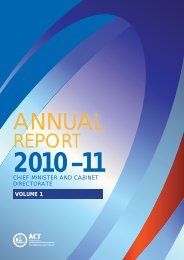Governing the City State - Chief Minister and Treasury Directorate ...
Governing the City State - Chief Minister and Treasury Directorate ...
Governing the City State - Chief Minister and Treasury Directorate ...
You also want an ePaper? Increase the reach of your titles
YUMPU automatically turns print PDFs into web optimized ePapers that Google loves.
central direction in developing <strong>the</strong>ir strategic plans <strong>and</strong> <strong>the</strong> governor wished for <strong>the</strong>budget, <strong>the</strong> statewide plan <strong>and</strong> agency plans to focus on <strong>the</strong> same set of goals. 274That is not to say performance budgeting is easy. Crucially, <strong>the</strong> simple “provision of thisinformation alone is not sufficient to improve performance: it has to be used in decisionmaking”. 275 It should not be assumed that <strong>the</strong> ACTPS has <strong>the</strong> necessary capacity orcapability to engage with performance information <strong>and</strong> use it to its greatest advantage. TheOECD cautions that member countries have experienced difficulties, especially in <strong>the</strong>irministries of finance in developing <strong>the</strong> necessary institutional capacity. It notes performanceinformation:is different from financial information. In order to make judgments <strong>and</strong> compareperformance, <strong>the</strong> [ministry of finance (MOF)] needs <strong>the</strong> relevant expertise to be ableto analyse <strong>and</strong> evaluate <strong>the</strong> information received from different spending ministries.Spending ministries … like <strong>the</strong> MOF, will need <strong>the</strong> capacity to underst<strong>and</strong> <strong>and</strong>276evaluate information <strong>the</strong>y receive.Performance <strong>and</strong> Accountability MechanismsAccountability of <strong>the</strong> Executive to <strong>the</strong> Legislature is fundamental to <strong>the</strong> Latimer HousePrinciples <strong>and</strong> is <strong>the</strong> cornerstone of any assessment of government performance. It is anaccepted <strong>and</strong> valued principle that permeates <strong>the</strong> governance framework in which <strong>the</strong> ACTGovernment <strong>and</strong> ACTPS operate. In a democracy, <strong>the</strong> key accountability relationships arebetween citizens <strong>and</strong> holders of public office, <strong>and</strong> between elected politicians <strong>and</strong>bureaucrats. 277Historically, Westminster bureaucracies are well suited to hierarchical lines of authority <strong>and</strong>accountability through <strong>the</strong> “chain of ministerial responsibility, upwards through <strong>the</strong>departmental hierarchy to <strong>the</strong> secretary <strong>and</strong> <strong>the</strong> minister <strong>and</strong>, via <strong>the</strong> minister, to Parliament<strong>and</strong> <strong>the</strong> public”. 278 These traditional hierarchical reporting <strong>and</strong> accountability lines are wellsuited where “it is clear what action should be taken, what <strong>the</strong> effects of that action will be, orwhere <strong>the</strong> Government prefers consistency <strong>and</strong> uniformity over innovation <strong>and</strong> creativity”. 279Traditional vertical accountability is given effect through parliamentary processes includingquestion time <strong>and</strong> committee processes which <strong>the</strong>mselves are often amplified through <strong>the</strong>media. These processes are supplemented by o<strong>the</strong>r mechanisms including independentinstitutions like auditors-general, ombudsmen, <strong>and</strong> <strong>the</strong> courts, as well as freedom ofinformation regimes. 280 In <strong>the</strong> ACT context, <strong>the</strong> Human Rights Commissioner should beadded to this list given <strong>the</strong> operation of <strong>the</strong> Human Rights Act 2004. 281274 Moynihan, D. & Ingraham, P. (2003) “Looking for <strong>the</strong> Silver Lining: When Performance-Based Accountability Systems Work”Journal of Public Administration, Research <strong>and</strong> Theory. 13(4) pp.469-490, p.481.275 Organisation for Economic Co-operation <strong>and</strong> Development (2007) p.40.276 Organisation for Economic Co-operation <strong>and</strong> Development (2007) p.69.277 Mulgan, R. (2000) ‘“Accountability”: An Ever-Exp<strong>and</strong>ing Concept?’, Public Administration, 78(3) pp.555-573. p. 556.278 Mulgan, R. (2002) “Accountability Issues in <strong>the</strong> New Model of Governance”. Discussion Paper No 91. Australian NationalUniversity, Canberra, pp.4-5.279 Australian Public Service Commission (2009b) Delivering Performance <strong>and</strong> Accountability Canberra, pp.51280 Mulgan (2002) pp.4-5281 See http://www.legislation.act.gov.au/a/2004-5/default.aspStrategy, Resource Allocation <strong>and</strong> <strong>the</strong> Vacant Middle Ground: 224



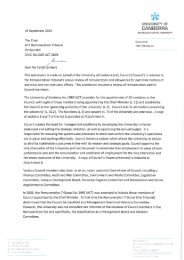
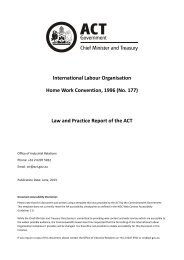
![HSR Training Programs Guidelines [ PDF 191KB]](https://img.yumpu.com/51348280/1/190x245/hsr-training-programs-guidelines-pdf-191kb.jpg?quality=85)






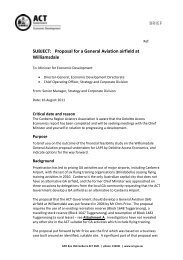
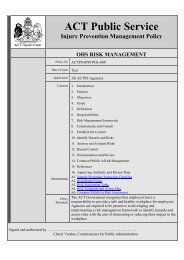
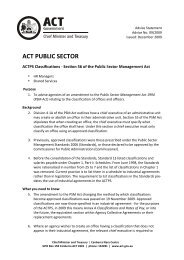
![Teachers Technical and Further Education [ PDF 68KB]](https://img.yumpu.com/34230751/1/184x260/teachers-technical-and-further-education-pdf-68kb.jpg?quality=85)
